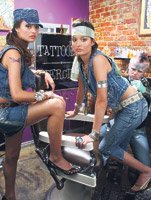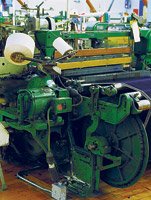Domestic Mills Court Premium-Denim Manufacturers
Brad Day wanted the fabric to be as all-American as the rest of his company. As the co-founder of Decent, he envisioned an ultra-premium denim brand that would sell for $240–$280. Armed with ideas and motivation, he began courting Cone Denim, one of fewer than a dozen U.S. denim mills still in existence.
But, as a small Los Angeles–based startup line, trying to get a meeting with the largest domestic denim producer was like trying to arrange a tecirc;te-agrave;-tecirc;te with the president. “It was nearly impossible to get someone on the phone,” says Day, “or to take us seriously, because we had nothing to show except our concepts and ideas.”
That was three years ago, practically an eternity in the world of fashion. Today, U.S. denim mills are more receptive than ever to young entrepreneurs with fresh ideas. So although premium denim (usually defined as jeans costing $70 or more) represents only about 2 percent of the jeans sold in the United States, mills have come to realize that it is the most visible and influential part of the market. Not only are they willing to develop innovative denim fabrications destined for small production runs, but they also offer a range of advice and workshops to help groom small manufacturers to become the next red-hot denim brand.
Decent ended up launching with Japanese denim, but Day continued to court Cone persistently, finally landing a meeting with Los Angeles–based sales rep Phil Goetz, who convinced the brand to change to domestic selvedge denim. “Everyone talks about how Japanese denim is so wonderful,” Day says, “and it is, but they are just using looms they bought from [the United States].”
Not only do smaller designers find domestic denim’s price and quality compelling, but there are also other pluses. The most obvious one, says Cone client Rob Crition, who launched Rob Inc. a year ago, is that domestic denim can be acquired more quickly than fabric from overseas. Crition, a former designer at Blue Cult and Hudson, says this helps to speed along the multiple stages of manufacturing and finishing.
Cone is “very focused” on L.A.’s premium denim makers, says senior vice president of sales and merchandising Ray Ericson—so much so that the company is planning to expand staff in its Los Angeles office. Though most of its clients are mass-market manufacturers, Cone takes the premium segment seriously and has several employees who stay on top of the latest trends as well as such new innovations as luxurious cashmere blends and waterproof denim.
Located in North Carolina, White Oak is Cone’s century-old mill devoted to smaller, premium customers who appreciate the plant’s long history and extensive archives. “We’ve set up new processes to service smaller accounts,” Ericson says, “including speed-to-market and flexibility with smaller quantities. We don’t get hung up on a minimum [order], because it turns people away. We do it on a case-by-case basis,” Ericson says. Cone also advises new clients on all aspects of the jeans business. “If it’s viable for us to pursue a relationship,” Ericson says, “we’ll recommend contractors and ask if they have a connection with a laundry.”
The tremendous growth in the premium segment over the past few years caused Cone to rethink its business strategy and begin actively grooming startups, which tend to direct where the overall denim market will head in subsequent seasons. “The premium U.S. market seems to be driving the industry worldwide,” Ericson says. And, with foreign competition not only from Japan and Italy but also China and India, “our goal is to develop new brands. We need to find ways to forge relationships with startups, because it’s the right thing to do for business in this hemisphere.”
Though Ericson declines to reveal a client roster, he says, “We’re pleased with the business we’re building in the premium segment.”BRANCHING OUT
Even mills with no prior experience making high-end denim have had to take notice of the premium craze. Mount Vernon Mills, based in Trion, Ga., specializes in mass-market denim but one year ago took on a premium client, Los Angeles’ own Frankie B. “We consider it an opportunity to diversify our product base,” says vice president of merchandising Dale McCallum.
Belgian denim and sportswear manufacturer UCO, originally founded in 1790, however, took a different approach. UCO began supplying Diesel with fabric in the 1990s and foresaw a premium-denim explosion in the United States. In 1998, the company bought a Rockingham, N.C.–based denim mill from Fruit of the Loom with the intention of catering to smaller, high-end designers. Mark Ix, vice president of sales and marketing, says, “People starting a denim brand have to be fairly intimidated to approach a huge textile mill and say, ’Hey, look at me, I have this great idea.’ Most people would say, ’Oh, another great idea,’ but we actually try to nurture that.”
Like Cone, UCO has no minimum orders. Although you can never tell who might become the next 7 for All Mankind, Ix says he can quickly recognize whether a new line has a true shot at denim greatness. “It either has to have a novel idea in terms of stitching, fabric or wash, or it’s got to be a very core, well-made five-pocket jean with nothing too tricky.”
Antik Denim and People’s Liberation are clients UCO believed in when they were fledgling lines. “They had an attitude,” Ix says, “something special that looks good and different. It’s not just throwing paint on a jean and calling it a cool wash.”
Premium denim is driven by novelty, Ix says, and UCO works closely with manufacturers to innovate new fabrications, such as cashmere and Kevlar blends, but does not share the results with other clients. To groom new brands, Ix says, “the key is to listen to the designers and give them the flexibility to do exactly what they want—and then guard that development with your life.” UCO’s mill comes up with 10 new denim experiments each day, Ix says. “And that’s a lot.”
Although domestic mills are open to new talent, there’s still an all-important audition process. It’s not enough to have sketches, funding and ambition: Mills are looking for startups that have a plan for every aspect of business, from marketing to retailing. If that’s all in place, the details of denim production can be learned, such as through Cone’s “Denim 101” workshops held in its Los Angeles office. “We take new designers and entrepreneurial folks and walk them through how denim is produced, from A to Z,” Ericson says. “It was specifically developed for new startup firms and is very successful.”
























